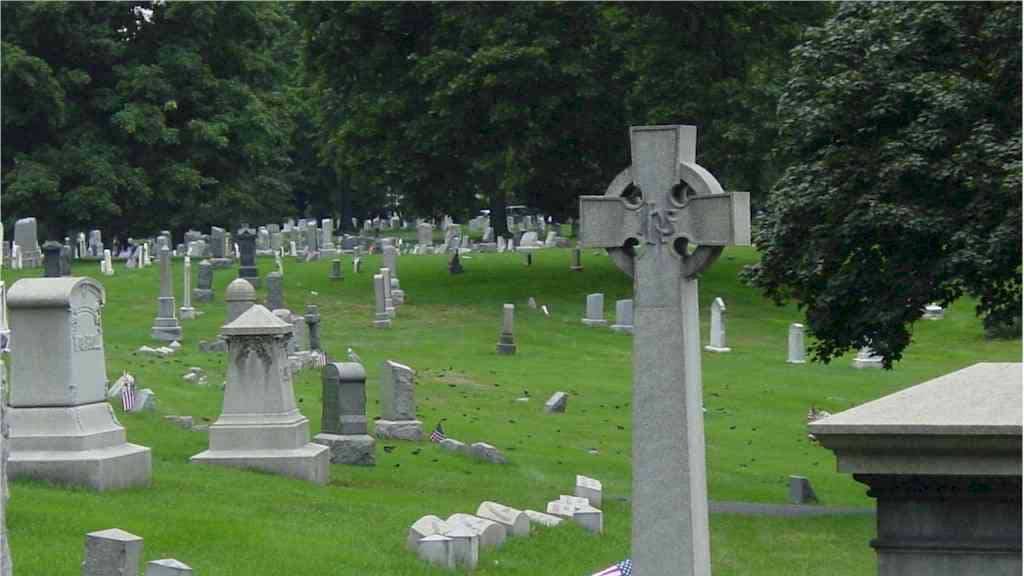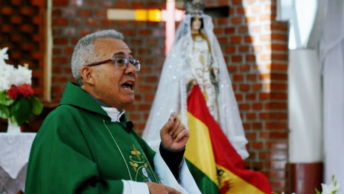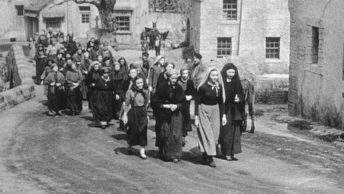Ash Wednesday is always a sobering experience. The solemn words, Remember you are dust and to dust you will return, vividly reminds us of our mortality. It is also a simple reminder that we all owe God a death, thanks to the loss of Eden. In addition to this first day of self-denial, there are almost daily reminders that underscore the same idea.
To paraphrase a catchy melody, I once heard in an awful British film, Death is all around us. The war in Ukraine, now in its second year, has claimed several thousand lives. Mass shootings happen on a regular basis, gang wars in our inner cities, police assassinations and the recent Covid-19 pandemic keep death ever-present in our minds. On a person note, I get regular notices from Xavier High School and Holy Cross about classmates who have recently died. Recently, I received a double notice of a mate who went to both schools. This past year also witnessed the death of an old friend whom I thought for one brief moment might have played a more significant role in my life.
Generally speaking, there are many people around the world who see death an instrument of social progress. I have written on this many times with reference to abortion. I read about a Yale professor who opined in 2021 that the only solution for the growing elderly population in Japan was mass suicide and mass seppuku.* According to the New York Times, Yusuke Narita has also said that mandatory euthanasia might be necessary someday. He has fast become a cult hero in Japan to many of its younger population who feel their economic progress has been held back.
Given our virtual economic bankruptcy with over a 33 trillion debt and the long-term depletion of the Social Security and Medicare trust funds and radical changes in Health Care, it would be unsurprising if this were not the case here. Trial balloons were already sent up during Obamacare with its implicit rationing and death panels. (Neither President Obama or his Vice-President shot them down.)
In the last 30 years, I have noticed that the merchants of death in this country, started making the same arguments for euthanasia as they had for abortion. In fact, euthanasia or a good death—for whom—is the other side of the abortion coin. I have been arguing for years that all the cataclysmic predictions of food and water shortages, the hole in the ozone layer, global warming, climate change, the New Ice Age, sustainability, killer meteors, the Doomsday Glacier or a new report that Deadly Fungi are Killing More Americans, are the vain predictions of crazed end-of the-worlders. These rants have been mostly the whining of the Neo-Malthusians. They irrationally fear that there are just too many people in this world. Humans make carbon footprints. World leaders then must exterminate a few billion people to significantly lower these footprints. This is not Science but mass murder on a global scale.
Suicide does not just affect the elderly. There seems to be an epidemic of self-destruction, whether intentionally or even accidentally, such as the epidemic of overdoses fatalities from Fentanyl around the country. People seem to lack the moral fiber of years ago when religious faith and family unity were relatively strong. I just read a story in the NYT where a beautiful high school student in New Jersey had been ambushed in her school corridor by another student. An accomplice had videotaped it and put it on TikTok. Her face was brutally smashed with a water bottle that nearly disfigured her smiling face. She told her father that she could not bear the humiliation…The day after the attack she retreated to her bedroom and took her own life. She was just 14-years-old.
I sometimes wonder if our country has much of a future given its obsession with death as a solution for its myriad of social problems. I often think back to Ronald Reagan when he was a spokesman for General Electric. I can still hear him recite their slogan: Progress is our most important product. Not only has GE’s stock slipped from those golden years, but many of our country’s leaders, celebrities and influencers believe that abortion, euthanasia and all the social perversions that slime our flag are social progress. Their idea of liberation is slavery and it walks in hand with the specter of death. Maybe we should adopt the vulture instead of the eagle as our national bird and the Skull and Crossbones, instead of the red, white and blue for our flag.
On a more positive note, Death can also be very instructive for us. To me a casual walk through a cemetery is often enlightening while it demonstrates the fact that everyone has a unique personal history. While History is primarily comprised of the public and personal lives and stories of thousands of people who played significant roles in the current events over the course of millennia, the markings on a grave spur my imagination to wonder what these people accomplished in their lives. The first truth is that not everyone has the same allotted time. While most seem to fit into a range, there are the young and very old exceptions. One can often get hints about a person’s life from the graves around them.
One of the most memorable poems from my junior year class in American Literature was Thomas Gray’s Elegy Written in a Country Church, which was published in 1751. According to one reviewer, his simple poem brings out the ultimate truth about life and death in free-flowing poetic lines. The poem evoked a tender sadness in me because of the way the poet ruminated on all the pleasures of hearth and home the deceased will be missing. It is also a poignant tale, describing the daily activities, such as the blazing hearth, children’s ritual of greeting their father and rushing to climb his knees, the envied kiss upon his nightly return from work.
In a mournful way, Gray was trying to imply the loss and memories, which accompanied a person’s death. I think Thornton Wilder’s play Our Town accomplished the same thing in a more dramatic way. I think that is why newspapers publish obituaries.The New York Times is especially adept at writing them. I have learned a lot about famous and significant historical figures from my almost daily reading its living history. They are factually sound and comprehensive, though I think most of them harken to late members of oppressed minorities or Woke activists. Theirs are in stark contrast to those of friends and family, which appear in the local papers. They are so formulistic that they seem written by the same person.
And perhaps they are. I wrote almost every word of my late wife’s obituary. Whereas I used some of their basic formula, I made her come alive with a lyrical flow, not found in many obits. Whenever I read it, I feel that her memory springs alive again. Like a beautiful portrait, my words painted a likeness that most people would have recognized immediately. I dare say that I am toying with writing my obituary. At our 50th reunion, all the survivors of the Class of 1965 at Holy Cross were asked to write some words about their lives since graduation. I wrote a short piece that could easily be described as outside the box or maybe even off the planet. My major point was a line I had heard in a John Cusack movie. It was said that the Greeks never wrote obituaries. They wanted to know just one thing about a man (or woman). Did they have ‘passion’? I think passion or its alter ego, enthusiasm, has dominated everything I have done during my life.
The end of a year is always replete with a necrology that reminds us how many well-know and famous peoples’ lives had ended that year. Reading the long list can be both tedious and fascinating. It is difficult to sum up a person’s life in just a short paragraph or two. Once the New Year rings in, I have been in the habit of saying well, that’s another year that will not complete my bracket.
I have a whole new kind of bracketology. Not to be confused with the pairings of what has been colorfully christened, March Madness, in college basketball, my bracketology is more concerned with personal history and thanatology. One thing virtually all gravestones have in common are a pair of brackets. I have always been fascinated with these brackets of life and death. They literally embody one’s life. Everyone is entitled to two brackets in life. At birth people get their first bracket. At death the second bracket closes out that life.
What really distresses me is that in the case of an aborted child, he/she does not even get their first bracket. There are no headstones or graveyards to pray or mediate on a lost life. This is an indication of the travesty of abortion that fails to recognize the humanity of the unborn. In St. Louis, there is a special place, named after my mother in Resurrection Cemetery where post-abortive women can go to mediate or pray for their lost babies. In Japan there is a cemetery filled with Jizo statues that represent a baby lost through miscarriage or abortion. A bracket, such as (1925-1927) also saddens me. I also feel so regretful for a life that was snuffed out, more than likely by diseases that could be cured today. Birthdays are for celebrations, not death. My sister-in-law was killed in an automobile accident in 1987 on her 34th birthday.
Finally, there is a saying that has always interested me. Let no man write my epitaph. Not to be confused with the 1962 film of the same name, it was Robert Emmet, an Irish Nationalist, who shouted these words from the British dock after he had been sentenced to death in 1803. Death was less of a problem for him than the specter that the people who executed him would taint his death with the breath of prejudice. Though my motivations were somewhat different, I decided to follow in his footsteps. My epitaph, which enhances my tombstone reads: Here lies the Baseball Professor**, he has finally stopped talking. If one must leave, better to leave them laughing…in perpetuity.
Like me, Benjamin Franklin and St. Paul wrote their own epitaphs. Here lies the body of Franklin, like an old book, stripped of its lettering and gilding… St. Paul’s will sound familiar: …the time of my departure has come. I have fought the good fight. I have finished the course, I have kept the faith…Winston Churchill’s is unsurprisingly self-effacing and lordly: I am ready to meet my Maker. Whether my Maker is prepared for the great ordeal of meeting me is another matter. Given my own epitaph, I like to think comedians have the edge as the one who wrote: I told them I was ill, or Rodney Dangerfield, There goes the neighborhood.
*An allusion to the name St. Louis sports writer and Hall of Famer, Bob Broeg tagged me with because I had taught what was arguably the very first accredited Baseball History course on a college campus, in the Midwest (1973-74) at the then Maryville College.
**Seppuku is ritual self-disembowelment that samurai warriors and Japanese generals committed for bringing dishonor to themselves. It often requires an assistant who lops off the disgraced one’s head to end his intense suffering.








